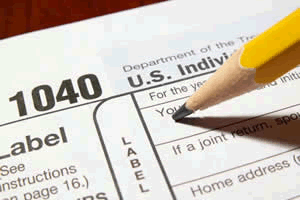Who has to file a federal income tax return?
There are several different reasons why an individual files a federal income tax return. These reasons include both times when it is required and times when the taxpayer will want to file even when it is not a requirement.
Primarily, whether an individual has to file a federal income tax return depends mainly on the individual's age, filing status, and the amount and type of income received by the individual. For the 2012 tax year, for which tax returns were due April 15, 2013, following are the minimum income requirements for each filing status above which an individual had to file an income tax return:
| Filing Status | Minimum Gross Income (under 65) | Minimum Gross Income (over 65) |
| Single | $9,750 | $11,200 |
| Head of Household | $12,500 | $13,950 |
| Married Filing Jointly | $19,500 | $20,650 (one spouse only) $21,800 (both spouses) |
| Married Filing Separately | $3,800 | $3,800 |
| Widow(er) with Dependent Child | $15,700 | $16,850 |
The above table applies to individuals who another taxpayer cannot claim as a dependent on their tax return.
Self-employed individuals who earn more than $400 are required to file a federal income tax return.
Reasons why you must file an income tax return
In addition, there are certain specific events that mean an individual must file a federal income tax return. These events include but may not be limited to the following:
- sale of a home
- receipt of an early distribution from certain qualified retirement accounts
- making excessive contributions to an IRA
- failing to receive a distribution from a qualified retirement account that is mandatory because of the individual's age
- receiving an excessively large distribution from a qualified retirement account
- receiving tips not reported to the individual's employer
Finally, even if an individual is not required to file a tax return, there are several reasons when the individual may want to file a tax return:
- If federal income taxes were withheld from wages earned by an individual or an individual made estimated tax payments during the year, the individual must file a federal income tax return in order to get that money back.
- For individuals who qualify for the Making Work Pay Tax Credit by having earned income from work, the individual must file a federal income tax return in order to receive any refund related to this credit.
- For individuals who qualify for the Earned Income Tax Credit by working and having earned income below the defined threshold, the individual must file a federal income tax return in order to receive any refund related to this credit.
- For individuals who qualify for the Child Tax Credit when they have one or more qualifying children, the individual must file a federal income tax return in order to receive any refund related to this credit.
- For individuals who are students who qualify for the American Opportunity Tax Credit, the individual must file a federal income tax return in order to receive any refund related to this credit.
Related Pages
Previous Question
What should I do if I can\'t afford to pay my tax debt when it is due?Next Question
Why am I being Audited by the IRS?Latest Question
Will my daughter inherit my debts when I pass?
Prior to the distribution of your assets and income, the courts will pay your debts.
Category: bankruptcy


